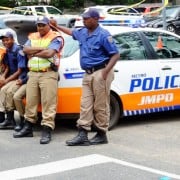|
Getting your Trinity Audio player ready...
|
 The final report of the Khayelitsha Commission (into Allegations of Police Inefficiency and a Breakdown in Relations between SAPS and the Community of Khayelitsha) was released yesterday. In it, the police force assigned to that area was blasted for its inefficiency and non-adherence to procedures.
The final report of the Khayelitsha Commission (into Allegations of Police Inefficiency and a Breakdown in Relations between SAPS and the Community of Khayelitsha) was released yesterday. In it, the police force assigned to that area was blasted for its inefficiency and non-adherence to procedures.
The 580-page report, dated 18 August, was handed to Western Cape premier Helen Zille on 25 August. Commissioners Kate O’Regan and Vusi Pikoli – both Corruption Watch board members – said they hoped that “the findings and recommendations contained in this report may assist in enhancing the safety of the people of Khayelitsha”.
Established by Zille in August 2012, the commission was mandated to investigate complaints, handed by a group of NGOs to the premier, of alleged inefficiency at the Lingelethu West, Harare and Khayelitsha Site B police stations in the community, as well as other police units operating there. It was also asked to investigate the breakdown in relations between the community and the South African Police Service (SAPS).
Like the Seriti Commission that’s currently investigating alleged corruption in the arms deal, the Khayelitsha Commission was also significantly delayed before it was able to start hearings, partly because of an interdict filed by then-national police minister Nathi Mthethwa to suspend the inquiry. The first round of public hearings finally took place between January and March 2014, and the second in May 2014. Closing arguments were delivered on 29 May. More than 100 witnesses testified before the commission during the approximately 40 days of hearings.
Download the full Khayelitsha Commission report.
Unfavourable findings
The commission found that high levels of poverty, poor infrastructure and very high crime rates in Khayelitsha made policing “profoundly challenging”.
It concluded that there are significant inefficiencies at the three Khayelitsha police stations and at the Khayelitsha Family Violence, Child Protection and Sexual Offences (FCS) unit. Some of the key findings include :
- there are no established guidelines for patrols of informal neighbourhoods;
- many crimes reported to the three Khayelitsha police stations and the FCS unit are not investigated properly or at all – cases are often withdrawn or struck off the roll in the Khayelitsha Magistrates’ Court because of incomplete police investigation or because dockets are not brought to court;
- crime scene management in Khayelitsha is often not in accordance with the prescribed protocol, partly because of environmental difficulties but also because of the lack of basic equipment and training;
- management at the three police stations, the cluster office and the FCS unit is ineffective;
- SAPS has no strategies in place to deal with the community’s two acute policing challenges – vigilante or vengeance attacks by community members on people perceived to be criminals, and youth gangs.
The commission noted that in its opinion, the quality of detective services at the three police stations is close to a crisis point.
It also concluded that there is a indeed breakdown between the Khayelitsha community and police stationed in the area – although this is not irreversible, there are high levels of distrust of the SAPS. Reasons included, among others:
- widespread perceptions that SAPS does not respond promptly to calls for assistance; and does not investigate crime properly or at all;
- many SAPS members do not act consistently with an understanding that policing is a service, and members of the public are often not treated with respect by SAPS members;
- vulnerable groups such as LGBTI people and foreign nationals report particularly high levels of discourteous and discriminatory treatment by SAPS members;
- a worrying perception, at least in some quarters, that some members of SAPS in Khayelitsha are corrupt.
Rectifying the situation
The commission has made a range of recommendations aimed at increasing the efficiency of SAPS’ operations in Khayelitsha and rebuilding the confidence of the community. They include :
- The establishment of an oversight and monitoring team to ensure that the inefficiencies identified at the three Khayelitsha police stations are eradicated;
- The adoption at each police station of a Community Policing Commitment in consultation with members of the community in which SAPS pledges, amongst other things, that its members will treat people with respect and respond to calls for assistance within specified times; provide feedback relating to the process of criminal investigations regularly to complainants; conduct visible policing patrols in both formal and informal neighbourhoods, as well as providing support to Neighbourhood Watch patrols; and recognise that vengeance or vigilante attacks by community members constitute criminal offences and will be dealt with by SAPS accordingly;
- A strategic review of detective services in Khayelitsha by the provincial commissioner, as well as the urgent redeployment of at least five experienced detectives to Harare and Khayelitsha Site B police stations, as well as backlog teams to be allocated to all three police stations and the FCS unit;
- The development of provincial guidelines in relation to the visible policing of informal neighbourhoods; and
- A review of the procedures by which complaints against members of SAPS are dealt with both by SAPS and IPID, and in particular that complaints against members of SAPS in Khayelitsha be investigated by the Khayelitsha cluster office rather than the police stations or units operating in Khayelitsha.
The commission stated that testimony has made it clear that "members of SAPS in Khayelitsha have not provided many of the residents of Khayelitsha with professional, respectful and efficient service. That is simply not acceptable."
It did concede that there are many committed SAPS members in the community who are trying to do their best with the available resources, but maintained that all South African residents are entitled to a police force that will protect them and keep them secure. "The task may be hard, but the obligation is clear."







